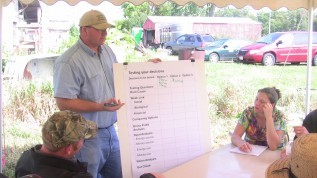The Paine Family Farm is an 80 acre grass-fed cattle operation in South-central Wisconsin. Bill and Laura Paine have been managing this farmstead for well over a decade, and in the process they have learned effective ways to make decisions, produce grass, and be a sustainable family farm.
On September 18th, 2013 HMI held an Open Gate field day at the Paine family farm. Over 60 people, mostly local livestock producers, participated in the day. Laura and Bill started by explaining the history and layout of the farm, and followed-up with a Q&A; questions from the audience were about numerous farm issues, including marketing, vaccinations, pricing, product distribution, and grazing rotation strategy.
After the Q&A, we headed out to the field to observe and discuss Laura's research with warm season perennial grasses. The Paine Family Farm is the site of an ongoing study to evaluate the merits of replacing cool-season exotic grasses with warm-season native perennials. This area of Wisconsin was once an oak-grass savannah, but centuries of cultivation have radically altered the landscape. Native perennial grasses have the potential to restore the native biodiversity of the region while providing some useful agroecological benefits. The primary benefit of planting native perennials is the capability of producing forage during a period when cool-season grasses are dormant and non-productive. A major drawback to this approach is the slow establishment time of the native perennials.
The field session was followed by lunch, which was generously served and sponsored by Johnson Sausage Shoppe, a local meat processor and distributor.
The group then engaged in a decision-testing exercise, where small groups determined if it made sense to increase forage production via expansion of perennial grass plantings. Most groups felt the decision to be risky one, and opted on the side of caution.
We concluded the day with an action learning exercise designed to foster producer to producer sharing and problem solving. In small groups, participants identified a critical problem in their production operation and worked together to propose potential solutions. Many participants commented on the value of getting new perspectives on old problems.
Participants manage a total of 4,868 acres of crop and grazing land. Results for the event are summarized below.
Thanks to event sponsors, including the CHF Foundation, George Koepp of Colombia County UW-Extension, Johnson Sausage Shoppe, Badgerland Financial, Wisconsin Department of Agriculture, and Colombia County Land and Water Conservation. Special thanks to Bill and Laura Paine for their hospitality and commitment to sustainable agriculture and their support of the local agricultural community.

